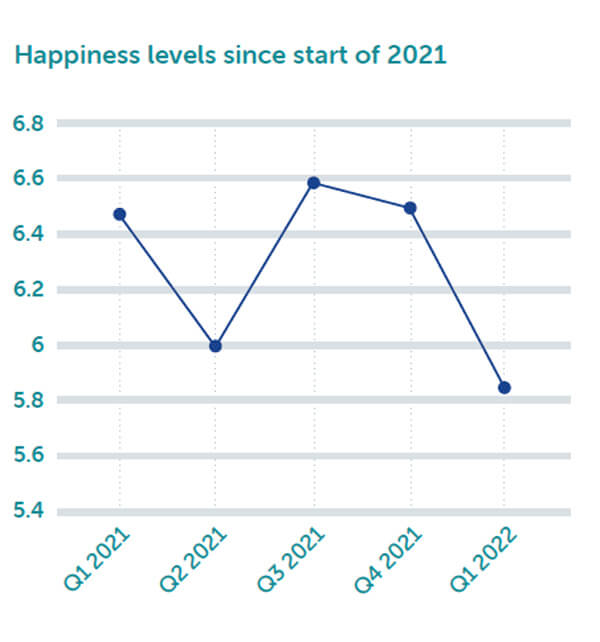While the crew change crisis has fallen out of public view as the COVID-19 pandemic stabilized and recede, many of the same issues continue to weigh heavily on seafarers. The latest Seafarer Happiness Index revealed that job satisfaction and overall happiness among seafarers have declined to an eight-year low.
“It’s hugely concerning to see seafarer satisfaction decline quite significantly in our latest Seafarers Happiness Index report, though unsurprising,” said Revd Canon Andrew Wright, Secretary-General of The Mission to Seafarers, organizers of the quarterly survey of more than 10,000 seafarers. “There are still actions that can be taken to improve seafarers’ quality of life. It is important to listen to and learn from seafarers’ experiences, to not only empathize with them but work together to find practical solutions that will improve life at sea.”
While it is not news that time at sea and the seafarer career is challenging, the survey points to troubling trends currently. The index’s measure of overall happiness decreased from 6.41 to 5.85 in the first quarter of 2022 with levels dropping across all categories. Seafarers reported dissatisfaction with working conditions, wages, living conditions and specifically food and the ability to remain fit onboard, training, ability to remain in contact with family ashore, and access to shore leave and the availability of welfare facilities on shore.

Two years after the outbreak of COVID-19, seafarers are still feeling the effects according to the report. With the waves of the Omicron impacting different countries during the first quarter, the index highlights seafarers who continue to face a maze of different regulations, ongoing port restrictions, and in many cases limited or no shore leave. Even when seafarers do get ashore, the report said many facilities are closed due to national restrictions, leaving them without support or basic services.
Adding to the continuing strains from the pandemic, Russia’s invasion of Ukraine reportedly also took a toll on seafarers. The report points to Ukrainian and Russian seafarers often working side by side on ships as well as concerns about families at home. ”Crewmembers from a host of nations including Ukraine, Poland, Romania, and Bulgaria, expressed concerns about tensions on board, which has implications not only for social cohesion on board, but safety too,” writes the report. Further, as the conflict has dragged on for two months, the Mission to Seafarers believes tensions appear to be rising.
Other issues identified by the new report are more constant concerns in the industry. They highlight employment rights, contractual issues, contract extensions that were frequently mentioned by seafarers, and the mental health strains of not being able to contact family members while away at sea.
“The substantial drop in seafarer happiness should be a wake-up call for the industry – we rely on seafarers every day for so much of what we take for granted – and yet, morale across the board has dropped,” said Capt. Yves Vandenborn, Director of Loss Prevention, at the Standard Club, one of the sponsors of the report. “The few positive comments from seafarers in this Seafarers Happiness Index should also be emphasized to show the importance of caring for our seafarers and how a small investment can go a long way.”
The report highlights a few elements taken to improve welfare and morale on board. Some seafarers highlighted the efforts to make life at sea more comfortable. The mentioned vessels having funds allocated for wellbeing events and activities. Among the examples cited were weekly crew gatherings, quizzes, karaoke, sports, TikTok video making, movie nights, and barbecues. Based on an analysis of the data, the report concludes, “there is a clear correlation between good connectivity, high-quality food, time for rest, recuperation and recreation, and the happiness levels of those on board.” They recognize the combined effects of many issues weighing on seafarers, urging ship owners and operators to focus on welfare and perennial problems including shore leave, connectivity, food, and exercise to improve morale among their crewmembers.
Source: The Maritime Executive





